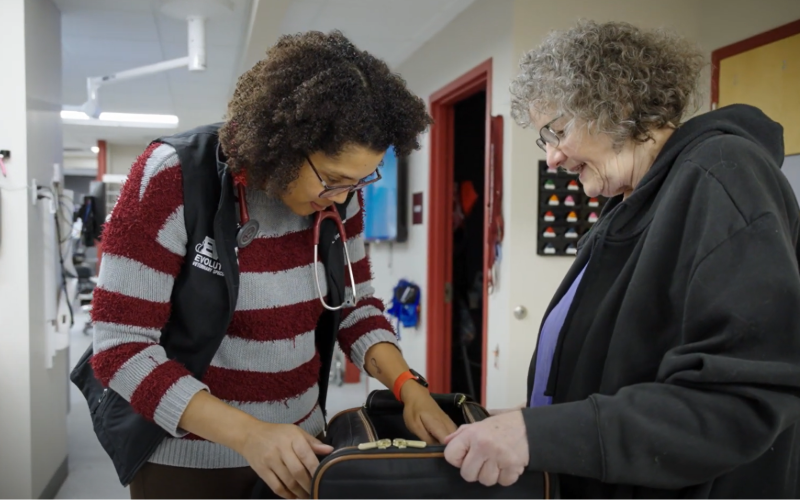Discovering the Crucial Solutions Used by a Vet Cardiologist: Understanding Ultrasound and CT Scan Strategies
Veterinary cardiologists play a crucial duty in the health and wellness of animals by identifying and dealing with different heart problems. They use sophisticated imaging techniques, such as cardiac ultrasound and CT scans, to supply precise evaluations. Each approach has its unique advantages and applications. Recognizing these strategies is necessary for pet dog proprietors seeking the very best look after their buddies. What aspects should pet proprietors think about when choosing in between these diagnostic tools?

The Duty of Veterinary Cardiologists in Pet Dog Healthcare
Veterinary cardiologists play a vital role in the health care of animals, focusing specifically on detecting and treating heart-related conditions. They possess specialized training that enables them to analyze complex analysis examinations and determine different cardiovascular problems. These experts make use of advanced strategies, such as echocardiography and electrocardiography, to examine heart function and structure accurately.Veterinary cardiologists additionally establish customized treatment strategies that may consist of drugs, lifestyle alterations, and, in many cases, surgical treatments. Their expertise includes informing family pet proprietors concerning heart wellness, emphasizing the value of normal check-ups and very early discovery of prospective issues. Cooperation with basic vets is essential, as it assures comprehensive treatment for pets with suspected heart problems. By providing specialized services, veterinary cardiologists substantially improve the lifestyle for pet dogs and offer peace of mind for their owners, enhancing the significance of heart wellness in total pet dog health.
Usual Cardiac Concerns in Family Pets
Usual cardiac issues in pets can significantly impact their wellness and lifestyle. Heart whisperings, numerous sorts of cardiomyopathy, and congenital heart problems are among one of the most widespread problems that veterinarians run into. Board Certified Veterinary Cardiologist. Recognizing these issues is necessary for family pet owners to guarantee timely medical diagnosis and ideal treatment
Heart Murmurs in Pets
Heart whisperings can be a source of problem for family pet owners, they are not constantly indicative of serious health concerns. A heart whispering is an abnormal noise produced by rough blood circulation within the heart. In pets, these murmurs can be brought on by various factors, consisting of hereditary heart problems, shutoff concerns, and even anxiety throughout assessments. Several pet dogs with heart murmurs lead normal lives without substantial wellness impacts. To figure out the underlying cause, vet cardiologists typically use analysis techniques such as echocardiograms and Doppler ultrasounds. Early detection and evaluation are necessary, as they may help handle any prospective heart issues efficiently. Animal proprietors are encouraged to consult their veterinarian for an extensive examination if a heart whispering is spotted.
Cardiomyopathy Types Explained
Cardiomyopathy includes a group of conditions impacting the heart muscle mass, leading to compromised cardiac function in pets. The most common types include dilated cardiomyopathy (DCM), hypertrophic cardiomyopathy (HCM), and restrictive cardiomyopathy (RCM) DCM largely affects dogs, creating the heart to damage and expand, which lessens its ability to pump blood successfully. On the other hand, HCM is extra widespread in felines, defined by the thickening of the heart walls, commonly resulting in obstructed blood circulation. RCM, though much less common, takes place when the heart muscular tissue ends up being rigid, restricting its ability to loaded with blood. Each type presents unique difficulties in diagnosis and therapy, necessitating specialized veterinary cardiological evaluation to guarantee peak management and take care of influenced pet dogs.
Congenital Heart Issues
Genetic heart problems represent a substantial classification of heart problems in family pets, distinct from acquired conditions such as cardiomyopathy - Cancer Veterinary Near Me. These defects are structural abnormalities existing at birth, impacting the heart's typical function. Common types consist of license ductus arteriosus, ventricular septal problems, and pulmonic constriction. Signs and symptoms may differ widely, ranging from light to extreme, and can consist of exercise intolerance, coughing, and trouble breathing. Early medical diagnosis with sophisticated imaging methods like ultrasound is essential for effective monitoring. Vet cardiologists play a crucial duty in identifying these problems and advising suitable therapy alternatives, which might include medical monitoring or medical intervention. Identifying congenital heart issues permits for much better outcomes and enhanced high quality of life for impacted animals
Recognizing Cardiac Ultrasound: Just How It Functions
A considerable number of vet methods currently utilize cardiac ultrasound as a necessary analysis device for assessing heart wellness in animals. This non-invasive strategy uses high-frequency sound waves to create pictures of the heart's structure and function. Throughout the procedure, a veterinary technician applies a gel to the animal's upper body and makes use of a transducer to emit ultrasound waves. These waves bounce off the heart and surrounding structures, generating real-time pictures on a monitor.Veterinarians can assess different facets of cardiac wellness, consisting of chamber dimension, wall surface movement, and best site shutoff feature. Furthermore, cardiac ultrasound enables for the discovery of irregularities such as fluid buildup and congenital heart defects. This method is vital for identifying conditions that might not show up with standard radiographs. By offering in-depth info about the heart's composition and performance, heart ultrasound help in creating effective therapy plans for animals experiencing heart condition.
The Importance of CT Checks in Diagnosing Heart Conditions
Just how do CT scans enhance the diagnosis of heart problems in vet medication? CT scans give comprehensive cross-sectional photos of the heart and bordering structures, allowing veterinarians to picture intricate physiological connections. This imaging strategy is particularly advantageous in determining genetic heart problems, cardiac lumps, and problems in blood vessels. By utilizing sophisticated imaging formulas, CT scans can evaluate heart chamber dimensions and feature, supplying a detailed sight that might be hard to accomplish with typical methods.Additionally, CT angiography can envision blood flow and identify locations of constriction or blockage, which is vital for preparing potential treatments. The rate and accuracy of CT scans likewise promote fast medical diagnoses, essential in emergency situation situations. Inevitably, the unification of CT checks right into vet cardiology greatly boosts the precision of diagnoses, allowing targeted therapy plans and improving person end results for pets dealing with heart problems.
Comparing Ultrasound and CT Scan Strategies
While both ultrasound and CT scans are indispensable tools in vet cardiology, they offer distinct advantages and constraints that influence their usage in detecting heart problems. Ultrasound, or echocardiography, gives real-time imaging of the heart's framework and feature, allowing vets to evaluate heart chambers, valves, and blood circulation. It is particularly efficient for examining conditions like congestive heart failure and cardiomyopathy. However, ultrasound may be limited in visualizing certain anatomical structures as a result of client dimension or obesity.In contrast, CT scans offer in-depth cross-sectional photos of the heart and surrounding cells, making them perfect for recognizing architectural problems, lumps, or vascular problems. Although CT scans provide detailed understandings, they call for sedation and may entail radiation exposure. Eventually, the choice between ultrasound and CT scans relies on the certain professional situation, the individual's condition, and the details needed for an accurate diagnosis.
Treatment Alternatives Offered Through Vet Cardiology
Vet cardiology uses a series of treatment alternatives tailored to deal with different heart disease in pets. Treatment plans often begin with way of living alterations, including diet regimen changes and workout changes, targeted at enhancing overall heart wellness. Medicines play a crucial duty, with cardiologists suggesting medications such as diuretics, beta-blockers, and ACE preventions to handle signs and symptoms and boost heart function.In a lot more extreme situations, interventional procedures, such as balloon valvuloplasty or stent placement, might be necessary to reduce blockages or improve blood flow. For particular congenital heart issues, surgical options might be checked out to fix architectural problems. In addition, continuous tracking and follow-up care are necessary parts of a comprehensive treatment plan, enabling prompt modifications based on the animal's reaction to treatment. Generally, veterinary cardiology concentrates on providing efficient, customized like enhance the health and wellness of animal clients with heart disease.
Just how to Prepare Your Pet for a Cardiac Evaluation
Preparing a pet for a cardiac analysis is necessary to guarantee accurate results and a smooth process. Proprietors need to initially set up the appointment with the veterinary cardiologist and talk about any kind of certain requirements or concerns. It is advisable to keep food for at the very least 12 hours prior to the evaluation, as this assists boost imaging quality during treatments like ultrasound or CT my site scans.Additionally, preserving a calm environment on the day of the appointment can help in reducing the pet's anxiousness. It is useful to bring along any kind of click for info appropriate medical documents, consisting of previous examinations and drugs (CT Scans For Dogs). Proprietors need to also make sure that their animal is comfy and leashed throughout transport to the center. Ultimately, acquainting themselves with the analysis procedure can ease concerns and assist in asking educated inquiries throughout the assessment. By adhering to these actions, proprietors can contribute greatly to the performance of the cardiac evaluation
Often Asked Concerns
The length of time Does a Heart Ultrasound or CT Check Take?
The duration of a heart ultrasound commonly ranges from 30 to 60 mins, while a CT scan may take around 15 to 30 minutes. Factors such as the person's condition can affect these time quotes.

Are There Any Kind Of Threats Linked With These Analysis Treatments?

Can I Keep With My Animal During the Procedure?
The vet facility's policy commonly dictates whether family pet proprietors can remain throughout treatments. While some centers motivate owner existence for convenience, others might call for separation to guarantee security and excellent conditions for diagnostic imaging.
Just how much Do These Analysis Tests Usually Expense?
The expenses of diagnostic tests, such as ultrasound and CT scans, typically vary based on place and facility. Typically, prices range from a few hundred to over a thousand dollars, reflecting the complexity and technology included.
What Is the Healing Process After a Heart Examination?
The recovery process after a heart analysis entails monitoring the pet for any immediate reactions, guaranteeing convenience, and limiting exercise. Vets generally offer post-evaluation instructions to direct pet owners throughout this crucial recovery duration. Heart murmurs, numerous kinds of cardiomyopathy, and hereditary heart defects are amongst the most prevalent problems that veterinarians encounter. A heart whispering is an abnormal noise generated by unstable blood flow within the heart. Cardiomyopathy incorporates a group of conditions affecting the heart muscular tissue, leading to jeopardized heart function in pet dogs. Hereditary heart problems represent a substantial category of heart issues in animals, unique from gotten conditions such as cardiomyopathy. Ultrasound, or echocardiography, offers real-time imaging of the heart's structure and feature, allowing vets to assess heart chambers, shutoffs, and blood circulation.
Comments on “Are CT Scans For Dogs Safe? Risks, Benefits, and What to Expect}”